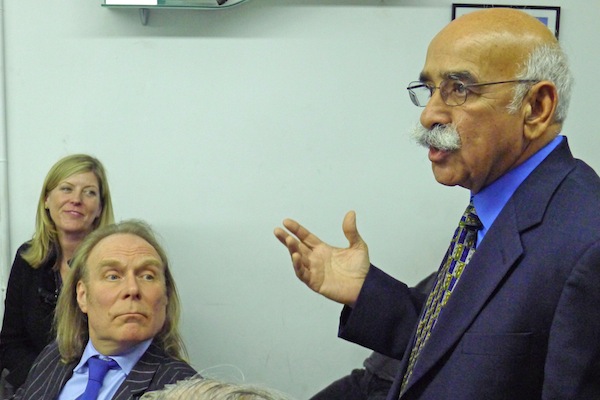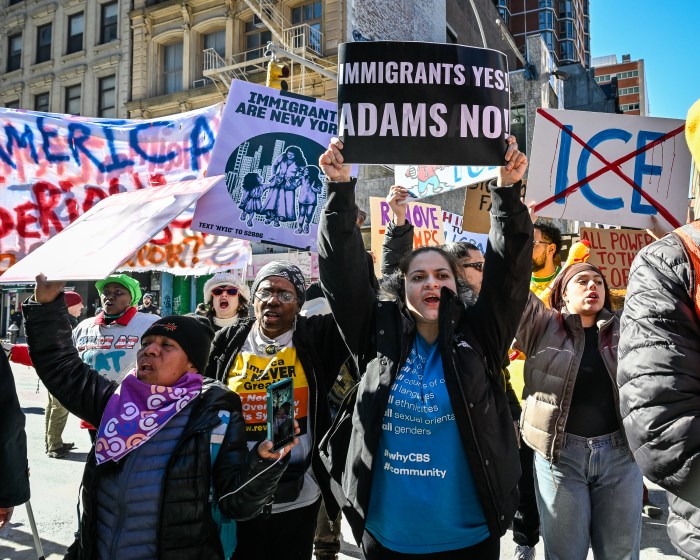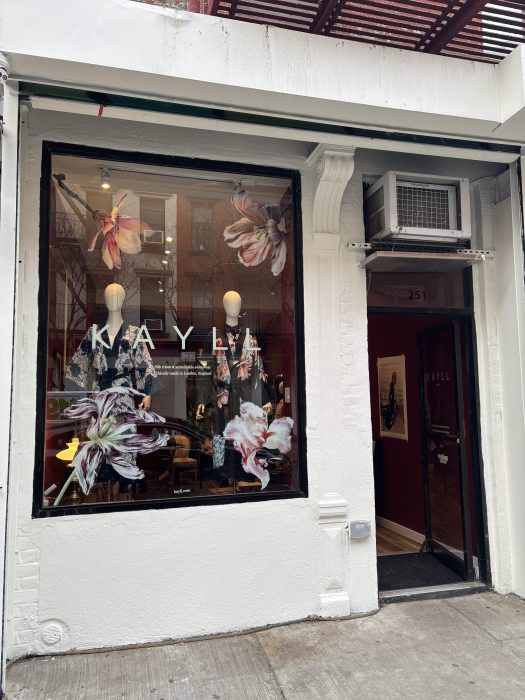
BY SAM SPOKONY | ORIGINALLY PUBLISHED FEB. 16, 2014 | Most of the time, controversial liquor license applications at the community board lead to long discussions over how late an establishment plans to serve drinks. But for a new Denny’s restaurant, which plans to open in May ― with a bar, in addition to its dining area ― at 150 Nassau St., the question was: how early is too early?
Representatives of the restaurant went before C.B. 1’s Seaport/Civic Center Committee on Feb. 18, hoping to secure a full liquor license that would allow patrons to chug one down with their breakfasts. With food service planned to start everyday at 5 a.m., they hoped to start serving alcohol at 10 a.m. on weekdays, 8 a.m. on Saturday and noon on Sunday.
Frances Allen, the restaurant chain’s chief brand officer, told the committee the request was, in part, based on “fitting in to the local community,” since this will be the first Denny’s in Manhattan.
“Manhattanites have a different kind of brunch culture,” she said, “so we feel it’s important for people to have the opportunity to enjoy a drink with a meal at whatever time of day.”
And Gurbax Marwah, the franchisee whose California-based company will own the Nassau St. restaurant ― along with 23 others across the country ― said it was just about business.
“We chose 10 a.m. for [weekdays] for the simple reason that there will be people coming from the Financial District, whether they’re entertaining clients, or they just want to have a snack and a refresher, so we will need them to be served,” said Marwah. He later added that he believed pushing any of the hours back could take away from his breakfast crowd.
But those impressions didn’t go over too well with the board, or the dozen residents who came out to oppose the early hours.
“You must have the point of view that a lot of Manhattanites are alcoholics, if you really think you’re going to lose the breakfast meals if people can’t have a drink that early,” said committee member Paul Hovitz.
He pointed out that most restaurants and bars in the area generally start serving alcohol around 11 a.m., and also noted that 150 Nassau St. is bit too far north to cater directly to Financial District business meetings.
“I’m just trying to figure out, who needs a drink at 10 a.m. next to [the Spruce Street School] and a university?” said Sarah Elbatanouny, a John St. resident whose daughter attends the elementary school, also referring to Pace University.
And Marijo O’Grady, Pace’s dean of students, opposed the early hours because she feared, among other things, “direct marketing to our students” regarding alcohol.
One resident of neighboring 140 Nassau St. attended the meeting to share a particularly blunt opinion of the situation.
“The kind of person who wants to have a drink before noon is not the kind of person I want in front of my building,” he said. “Or in my neighborhood.”
This all came after nearly a year of conflict surrounding the new Denny’s, during which the condo board at 150 Nassau St. had sued to try to keep out the restaurant, which was originally proposed as a 24-hour establishment that sought to serve alcohol until 4 a.m. That resulted in a settlement allowing the plan to move forward, but also stipulating that no liquor will be served after midnight. By the time of their Feb. 18 application, the Denny’s representatives had already agreed to the earlier “last call” time.
And although Marwah and the Denny’s crew refused to budge on the morning hours over the course of the committee’s discussion, they were eventually forced to deal with a different outcome.
The committee passed a resolution recommending approval of the liquor license, as long as the restaurant begins serving drinks at 11 a.m. on weekdays, 10 a.m. on Saturdays and noon on Sundays. After it passed, Marwah said he would agree to the new times if the full board passed the resolution at its Feb. 25 meeting. The State Liquor Authority will weigh the community board’s resolution before deciding on the license.
But just before the Feb. 18 vote on the amended hours, Richard Rosen, an attorney representing Marwah, had tried to reframe the discussion in a final appeal to the board, referring both to the previous lawsuit and the current debate.
“This has all started off with a presumption, on the part of many people, that the Denny’s that is going to open in your neighborhood will have all kinds of problems,” said Rosen. “And I’m not going to say that I don’t understand why people have these concerns, and it’s appropriate for people to have concerns. But one thing I would ask people to do, in terms of being fair-minded, is to recognize that these are concerns that are in fact based on presumption, maybe about things that have happened in the past in different states.”
“All I’m saying is, give this a chance,” he continued. “I think that, six months from now, people will say, ‘Wow, why were we so worried about this?’”
But as the final resolution showed, that appeal like Allen’s culture pitch and Marwah’s business pitch, simply didn’t play well to C.B. 1 or the crowd.
“Our presumptions are not based on what happened in a different state,” said Hovitz, responding to the attorney. “Our presumptions are based on what happens in New York City, and that’s because we’ve weighed in on so many of these kinds of problems here.”




































